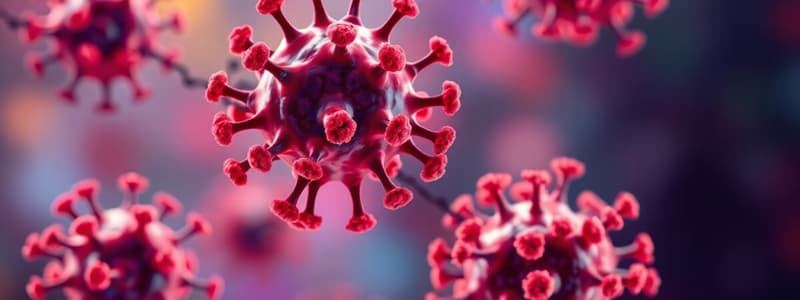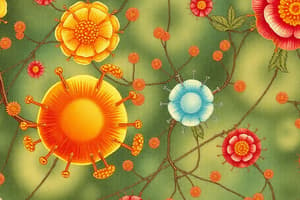Podcast
Questions and Answers
Which type of MHC molecule is found on all nucleated cells in the body?
Which type of MHC molecule is found on all nucleated cells in the body?
- MHC Class II
- Neither MHC Class I nor II
- Both MHC Class I and II
- MHC Class I (correct)
MHC Class II molecules display peptides from inside the cell.
MHC Class II molecules display peptides from inside the cell.
False (B)
What type of T-cell is activated by antigens presented on MHC Class I molecules?
What type of T-cell is activated by antigens presented on MHC Class I molecules?
Cytotoxic T-cells
Helper T-cells are activated by antigens presented on MHC Class ___ molecules.
Helper T-cells are activated by antigens presented on MHC Class ___ molecules.
Which of the following is NOT a professional antigen-presenting cell?
Which of the following is NOT a professional antigen-presenting cell?
What is the primary function of dendritic cells?
What is the primary function of dendritic cells?
B cells, once activated, produce cytokines.
B cells, once activated, produce cytokines.
Match the following cell types with their primary function:
Match the following cell types with their primary function:
What is the primary function of Helper T-cells?
What is the primary function of Helper T-cells?
Cytotoxic T-cells primarily function by releasing cytokines.
Cytotoxic T-cells primarily function by releasing cytokines.
What role do Regulatory T-cells (Tregs) play in the immune system?
What role do Regulatory T-cells (Tregs) play in the immune system?
Natural Killer (NK) Cells do not rely on MHC for __________.
Natural Killer (NK) Cells do not rely on MHC for __________.
Which of the following are key functions of cytokines?
Which of the following are key functions of cytokines?
Match the following immune cell types with their functions:
Match the following immune cell types with their functions:
What is the function of the complement system in the immune response?
What is the function of the complement system in the immune response?
The main role of Interferons is to stimulate immune cell growth.
The main role of Interferons is to stimulate immune cell growth.
Flashcards
MHC: Major Histocompatibility Complex
MHC: Major Histocompatibility Complex
MHC molecules are like cellular billboards that display fragments of proteins (antigens) to immune cells. They are crucial for the immune system to recognize and respond to foreign invaders.
MHC Class I
MHC Class I
MHC Class I molecules are found on all nucleated cells in the body. They present fragments of proteins from inside the cell, like viral proteins, to Cytotoxic T-cells (CD8+ T-cells).
MHC Class II
MHC Class II
MHC Class II molecules are found on professional antigen-presenting cells (APCs) like macrophages, dendritic cells, and B-cells. They display fragments of engulfed pathogens to Helper T-cells (CD4+ T-cells).
Antigen-Presenting Cells (APCs)
Antigen-Presenting Cells (APCs)
Signup and view all the flashcards
Dendritic Cells
Dendritic Cells
Signup and view all the flashcards
Macrophages
Macrophages
Signup and view all the flashcards
B-Cells
B-Cells
Signup and view all the flashcards
Helper T-Cells (CD4+ T-cells)
Helper T-Cells (CD4+ T-cells)
Signup and view all the flashcards
What are Cytotoxic T-cells (CD8+ T-cells)?
What are Cytotoxic T-cells (CD8+ T-cells)?
Signup and view all the flashcards
What are Natural Killer (NK) Cells?
What are Natural Killer (NK) Cells?
Signup and view all the flashcards
What are cytokines?
What are cytokines?
Signup and view all the flashcards
What is the Complement System?
What is the Complement System?
Signup and view all the flashcards
What are Dendritic Cells and Macrophages?
What are Dendritic Cells and Macrophages?
Signup and view all the flashcards
What are Helper T-cells (CD4+ T-cells)?
What are Helper T-cells (CD4+ T-cells)?
Signup and view all the flashcards
What are B-cells?
What are B-cells?
Signup and view all the flashcards
What are Regulatory T-cells (Tregs)?
What are Regulatory T-cells (Tregs)?
Signup and view all the flashcards
Study Notes
Major Histocompatibility Complex (MHC)
- MHC molecules act like cellular billboards, displaying protein fragments (antigens) to immune cells.
- Two main types of MHC molecules: Class I and Class II.
MHC Class I
- Found on all nucleated cells.
- Purpose: Displays protein fragments from inside the cell (e.g., from viruses if infected).
- Function: If a cell is infected or cancerous, it displays abnormal proteins. This alerts cytotoxic T-cells (CD8+ T-cells) to destroy the infected or abnormal cell.
- Analogy: Like a security guard checking IDs; suspicious IDs (foreign proteins) trigger removal of the threat.
MHC Class II
- Found only on professional antigen-presenting cells (APCs) like macrophages, dendritic cells, and B-cells.
- Purpose: Displays protein fragments from pathogens engulfed and digested by the APC.
- Function: MHC Class II presents these peptides to helper T-cells (CD4+ T-cells). Helper T-cells coordinate the immune response by activating other immune cells (e.g., B-cells to produce antibodies or cytotoxic T-cells to kill infected cells).
- Analogy: Like a teacher sharing information with students so they can respond effectively.
Cellular Defense Mechanisms
- Antigen-Presenting Cells (APCs) are crucial in initiating immune responses.
- Dendritic cells, macrophages, and B-cells are key APCs, each presenting antigens in varying ways.
Studying That Suits You
Use AI to generate personalized quizzes and flashcards to suit your learning preferences.




